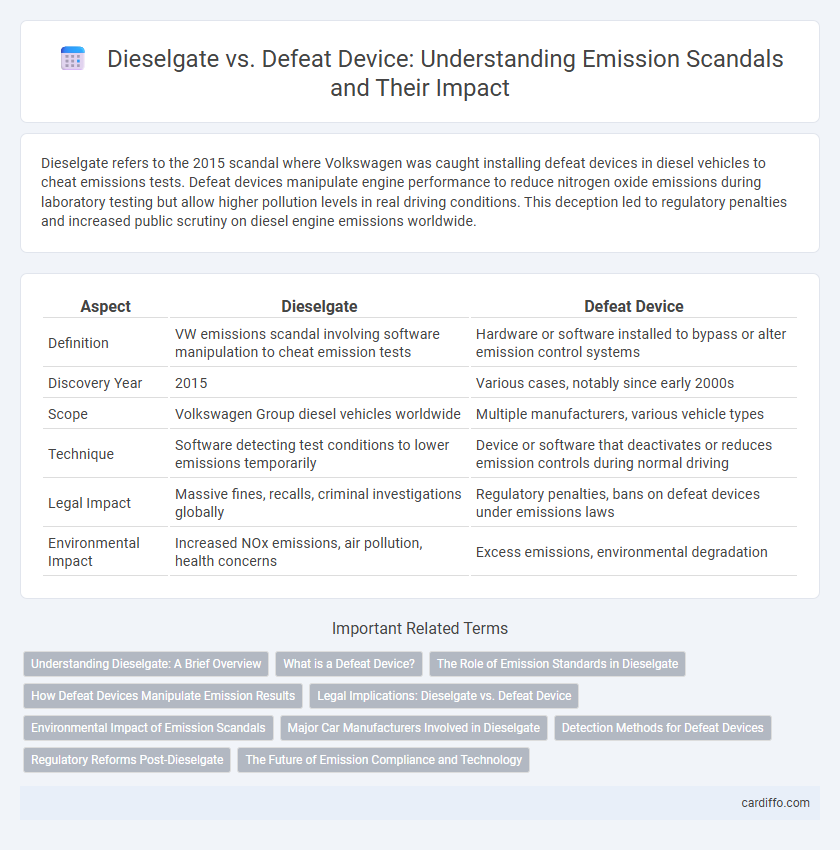Dieselgate refers to the 2015 scandal where Volkswagen was caught installing defeat devices in diesel vehicles to cheat emissions tests. Defeat devices manipulate engine performance to reduce nitrogen oxide emissions during laboratory testing but allow higher pollution levels in real driving conditions. This deception led to regulatory penalties and increased public scrutiny on diesel engine emissions worldwide.
Table of Comparison
| Aspect | Dieselgate | Defeat Device |
|---|---|---|
| Definition | VW emissions scandal involving software manipulation to cheat emission tests | Hardware or software installed to bypass or alter emission control systems |
| Discovery Year | 2015 | Various cases, notably since early 2000s |
| Scope | Volkswagen Group diesel vehicles worldwide | Multiple manufacturers, various vehicle types |
| Technique | Software detecting test conditions to lower emissions temporarily | Device or software that deactivates or reduces emission controls during normal driving |
| Legal Impact | Massive fines, recalls, criminal investigations globally | Regulatory penalties, bans on defeat devices under emissions laws |
| Environmental Impact | Increased NOx emissions, air pollution, health concerns | Excess emissions, environmental degradation |
Understanding Dieselgate: A Brief Overview
Dieselgate refers to the scandal where Volkswagen installed defeat devices in diesel engines to manipulate emissions tests and emit pollutants beyond legal limits. Defeat devices are software or hardware mechanisms designed to detect testing conditions and temporarily reduce emissions, misleading regulators. This practice led to significant regulatory penalties and reshaped global emission standards for diesel vehicles.
What is a Defeat Device?
A defeat device is software or hardware installed in a vehicle to manipulate emissions controls during testing, ensuring compliance with legal standards while allowing higher emissions during normal driving conditions. It deliberately alters engine performance to reduce pollutants only during official emissions tests, as exposed in the Dieselgate scandal involving Volkswagen. Regulatory agencies consider defeat devices illegal due to their role in misleading emissions measurements and causing increased environmental pollution.
The Role of Emission Standards in Dieselgate
Emission standards played a critical role in the Dieselgate scandal by setting regulatory limits that manufacturers were expected to meet, prompting VW to install defeat devices to cheat on emissions tests. These defeat devices enabled vehicles to emit nitrogen oxides (NOx) at levels far above legal thresholds during regular driving while passing laboratory tests by temporarily reducing emissions. The scandal highlighted the gap between real-world emissions and test conditions, leading to stricter enforcement and more accurate emissions measurement protocols globally.
How Defeat Devices Manipulate Emission Results
Defeat devices manipulate emission results by altering engine performance during official testing to pump out fewer nitrogen oxides (NOx) and pollutants, misleading regulators about real-world emissions. These software algorithms detect test conditions like speed and acceleration patterns, switching the engine into low-emission mode only during laboratory cycles. As a result, vehicles emit significantly higher levels of harmful pollutants on roads, contributing to increased air pollution and severe violations of environmental regulations.
Legal Implications: Dieselgate vs. Defeat Device
Dieselgate exposed the use of defeat devices--software designed to cheat emissions tests--leading to widespread legal consequences including hefty fines and criminal charges for automakers like Volkswagen. Regulatory agencies worldwide tightened emissions testing protocols, leveraging evidence from defeat device detections to enforce stricter compliance. Legal implications extend beyond fines, encompassing class-action lawsuits and mandates for vehicle recalls to restore environmental and consumer trust.
Environmental Impact of Emission Scandals
The Dieselgate scandal exposed how defeat devices manipulated emissions tests, resulting in vehicles emitting nitrogen oxides at levels up to 40 times the legal limit, causing severe air pollution and health hazards. This deceptive practice significantly contributed to smog, respiratory diseases, and environmental degradation across urban regions worldwide. Governments intensified regulatory scrutiny and emissions standards to mitigate the long-term environmental harm caused by such emission scandals.
Major Car Manufacturers Involved in Dieselgate
Volkswagen Group, including Audi, Porsche, and Skoda, was the central player in the Dieselgate scandal, admitting to installing defeat devices in millions of diesel vehicles to cheat emissions tests. Other major manufacturers implicated include Fiat Chrysler Automobiles (FCA), which faced similar accusations of using defeat devices in diesel engines. Additionally, Mercedes-Benz and Renault were investigated for deploying sophisticated defeat device technologies to manipulate nitrogen oxide (NOx) emissions during regulatory testing.
Detection Methods for Defeat Devices
Detection methods for defeat devices in diesel engines primarily involve advanced emissions testing protocols such as Real Driving Emissions (RDE) testing and Software Analysis of Engine Control Units (ECUs). RDE testing monitors pollutant levels under actual driving conditions to reveal discrepancies between laboratory and real-world emissions, exposing the manipulation characteristic of defeat devices. Furthermore, reverse engineering and on-board diagnostic (OBD) system analysis help identify hidden code designed to alter emissions output during regulatory testing.
Regulatory Reforms Post-Dieselgate
Regulatory reforms post-Dieselgate have led to stricter emission testing protocols and enhanced transparency requirements for automakers. The introduction of Real Driving Emissions (RDE) testing in the European Union and the tightening of the Environmental Protection Agency's (EPA) oversight in the United States aim to detect and prevent the use of defeat devices in diesel engines. These reforms emphasize durability in emission controls and mandate on-road measurement systems to ensure compliance with nitrogen oxide (NOx) and particulate matter (PM) standards.
The Future of Emission Compliance and Technology
The future of emission compliance hinges on advanced sensor technology and real-time data analytics to detect and prevent defeat devices like those used in Dieselgate. Stricter regulations and enhanced verification methods will drive automakers to adopt transparent emission reporting and invest in cleaner powertrains such as electric and hydrogen fuel cells. Innovations in AI-powered onboard diagnostics and blockchain-based supply chain monitoring will further ensure compliance and minimize emission fraud.
Dieselgate vs Defeat Device Infographic

 cardiffo.com
cardiffo.com